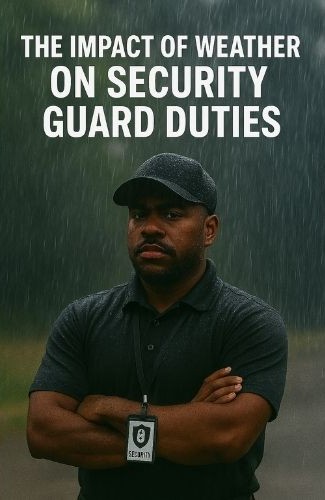Most citizens do not understand the greater role of weather in security work. Extreme weather can change quickly, whether it is heavy rain or intense heat; this may interfere with the patrolling, monitoring, and responding that the guards can conduct. Professional security implies not only being willing to change in connection with these challenges but also to sustain a steady level of protection. The Impact of weather on security guard duties is huge and here is why:
The Effect of Weather on the Day to Day Security Operations
The security guards are usually in the outdoors or mixed indoor-outdoor environments and this implies that the weather may directly affect their performance. Every season and climate presents its problems.
- Rain and Storms – Visibility lessens, surfaces become slippery and allow power outages to occur which make patrol very difficult.
- Extreme Heat – Causes more heat exhaustion and frequent breaks and hydration need to take place.
- Cold and Snow – This causes problems of mobility and requires additional protective clothing.
- Strong Winds – This may destroy property, trigger alarms or create safety hazards due to debris.
Being aware of these factors enables security teams to be ahead of the game and enable them to change their strategies.
Learn more about: What Are a Guard’s Duties?
Adapting Security Duties to Weather Conditions
Professional security providers plan for weather variations just as they would for any other operational risk. Adjustments may include:
- Modified Patrol Routes – Using safer paths when conditions make certain areas hazardous.
- Additional Protective Gear – Raincoats, thermal clothing, or sun protection to ensure guard comfort and safety.
- Extra Staffing or Support – Assigning backup personnel during severe weather to maintain coverage.
- Enhanced Communication – Using radios or mobile devices to limit unnecessary exposure to harsh conditions.
These adaptations keep both the guard and the property safe, regardless of environmental challenges.
The value of Preparedness and Training
The most appropriate way of managing risks that are related to weather is by providing adequate training on hazard awareness and response among guards. Preparedness encompasses issues on how to maintain service irrespective of the weather conditions; it goes beyond being someone who knows how to manage service during icy walkways, or it could be during extreme heating problems. With a properly trained group, the quality of security can be observed without the need to endanger personnel.
Conclusion
There will always be uncertainty about the weather but the safety is persistent. Security guards may provide consistent protection at any time by knowing the possible challenges and adapting operations. Effective security strategy considers the environment as much as the possible threats.


